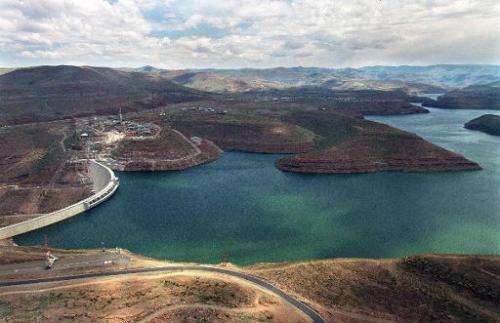A picture taken November 10, 1997 shows the Katse Dam, which forms part of the Lesotho Highlands Water Project in South Africa
South Africa and Lesotho ceremonially launched Thursday the second phase of a massive water transfer project, their biggest joint infrastructure investment.
Work on the 14-billion-rand ($1.3-b illion, 950-million-euro) second phase of the Lesotho Highlands Water Project is expected get underway next month with the construction of a 155-metre (508-foot) high Polihali Dam and tunnels.
South Africa's President Jacob Zuma called it a "win-win" project, as impoverished Lesotho will secure revenue while South Africa gets water.
Launched in 1998, the project provides South Africa with the scarce resource, while contributing to the economic growth of the tiny mountainous kingdom, known for its large water reserves.
The project situated in the northern part of the country is expected to be fully operational in 2022.
Lesotho has benefited from significant infrastructure development since the inception of the scheme, including road linkages and upgrades.
The landlocked country, entirely surrounded by South Africa, also generates hydro-power from the large dams built so far.
The first phase of the project supplies South Africa with about 10 billion cubic meters of water a year, and the amount will increase to 17 million cubic meters with the completion of the second phase, according to the South African Water and Environmental Affairs department.
"This is a good opportunity for the people of Lesotho and South Africa, not only will many people get jobs but our relationship as countries continue to be strengthened through projects such as these," said Zuma.
But the project has not been without controversy. Last year Lesotho youths called for it to be reviewed, saying the partnership favoured South Africa.
South Africa is a water-scarce country, and supply has in recent years come under pressure from population growth and industrial activity.
At the lauch, Zuma said the new Polihali Dam will go a long way in alleviating the strain.
Water is Lesotho's major export to South Africa, where 62 percent of the 2 million population lives on less than two dollars a day.
© 2014 AFP






















